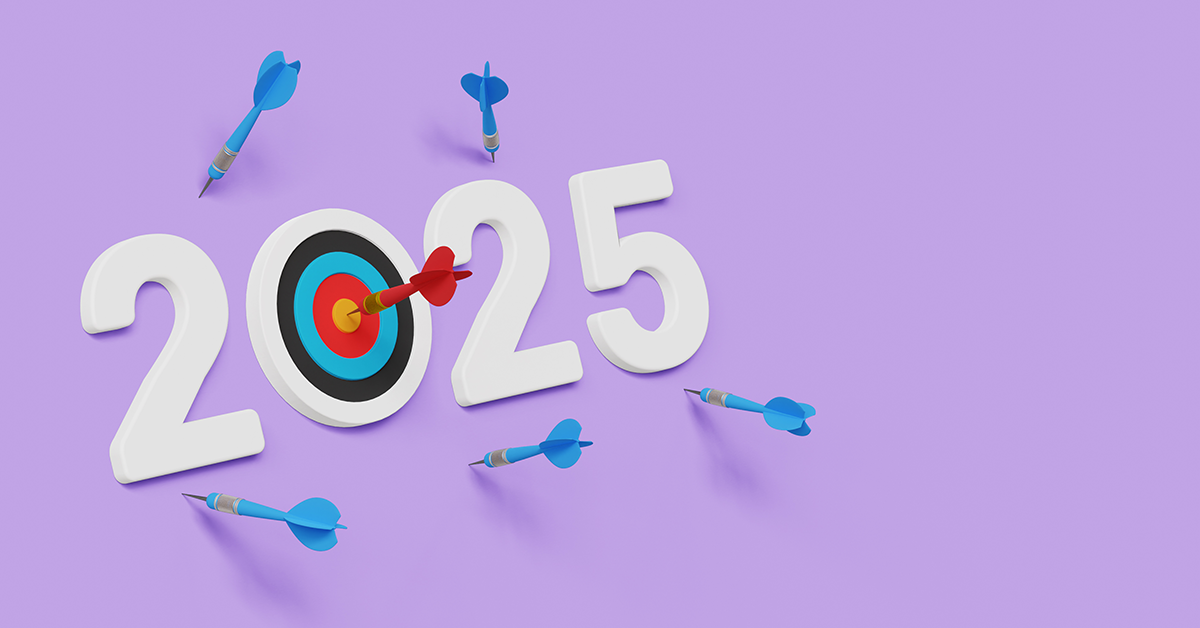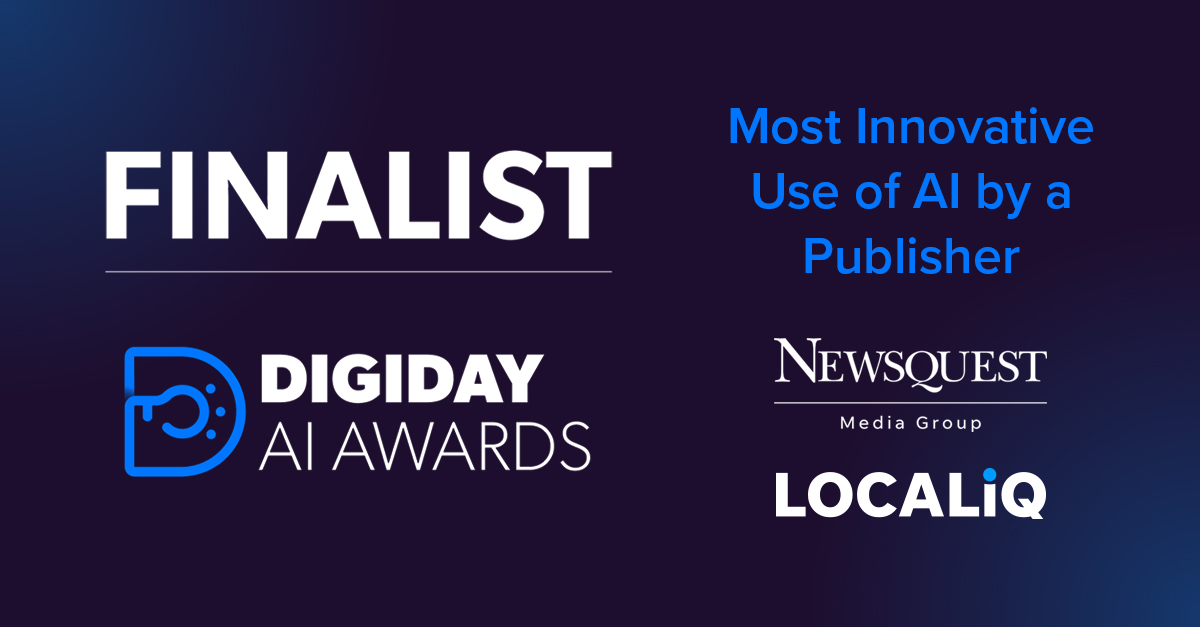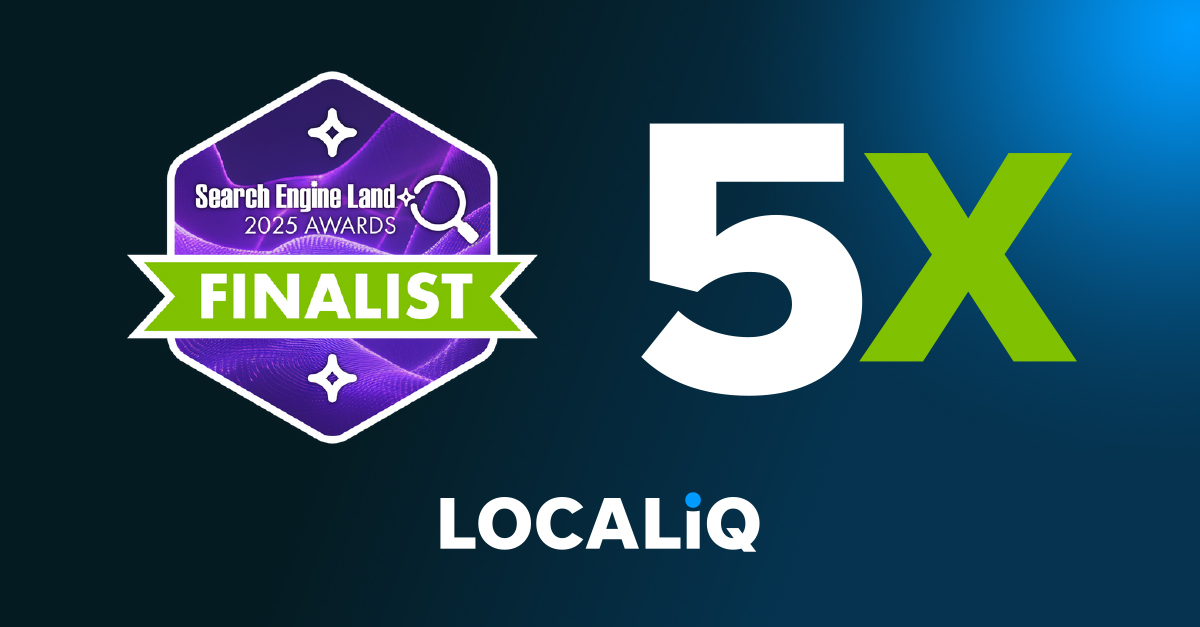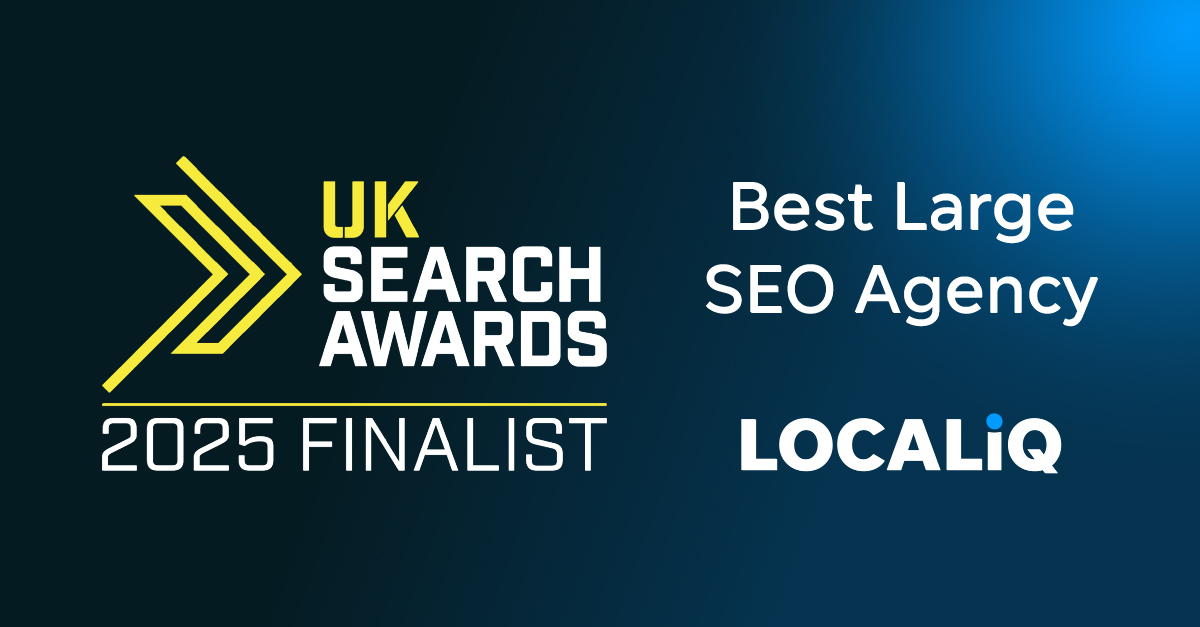The level of intelligence of AI in marketing has dramatically increased overnight. That’s probably the understatement of the year.
Many companies and their marketing teams are rapidly adopting AI in marketing to improve operational efficiency and customer experience. This optimisation method yields AI-driven insights that boost conversions and helps businesses work faster.
In fact, the rate at which the technology is being used is increasing to the point that experts predict that sales of AI for marketing purposes will go from $27.4 billion in 2023 to $107.5 billion in 2028.
In this article, we will define artificial intelligence in digital marketing, discuss the pros and drawbacks of implementing AI in your business, and show how AI can save businesses time and money.
Level up your marketing with LOCALiQ
Subscribe to our monthly newsletter
What Is AI in Digital Marketing?
The term “AI in digital marketing” is used to describe the various ways in which artificial intelligence can help in digital marketing efforts.
AI marketing tools are applications and web-based systems that collect customer information and then use it to create and send highly personalised messages at optimal moments. Data is collected, evaluated, and interpreted in light of market trends to arrive at these conclusions.
AI in digital marketing improves the performance of pay-per-click advertising, customises website experiences, generates new content, and even predicts consumer behaviour. There is no human involved in any of this. It all happens in real time and automatically.
Studies show that by 2025, generative AI will be responsible for 10% of all data creation, up from 1% in 2022, according to Gartner.
In light of this, let’s look at the benefits of incorporating AI in digital marketing.
Benefits of Leveraging AI in Digital Marketing
The benefits of adding AI marketing to your digital marketing strategies vary depending on the specific use case. Let’s look at some of the benefits below:
A Higher Campaign ROI
If used properly, AI marketing has the potential to completely revolutionise a company’s marketing strategy by surfacing the most actionable insights from data in real time. AI platforms can quickly decide how much money should be spent on which marketing channels, or they may examine which advertisements regularly generate the most interest among target audiences.
Real-Time Personalisation and Improved Customer Relationships
With the help of AI, you can target specific clients with relevant messages at key moments in their buying journey. Digital marketers may use this information to pinpoint disengaged consumers and re-engage them with the business through targeted messages.
Improved Marketing Measurement
It is difficult to attribute results to individual digital marketing initiatives because of the sheer volume of data generated, and many businesses could use a little help in this area. AI in digital marketing dashboards provides a complete picture of what is successful, allowing for its replication across channels and the allocation of appropriate resources.
Speed Up Decision-Making
AI in digital marketing can do tactical data analysis using machine learning to draw conclusions based on campaign and consumer contexts much more quickly than humans. Because of this, team members have more time to concentrate on long-term projects that will ultimately guide AI-powered advertising activities.
But all’s not well in the world of AI marketing. There are significant roadblocks to adopting AI too.
Challenges for AI in Digital Marketing
Marketing teams must be cautious when deciding how to incorporate AI into their strategies and procedures. AI marketing technologies have just begun to emerge from their infancy. Accordingly, before fully integrating AI into your digital marketing strategy, there are some obstacles to consider.
Quality of Data and Training Time
AI marketing solutions need an innate understanding of how to accomplish marketing goals. Learning corporate objectives, client likes and dislikes, and historical patterns, gaining familiarity with the bigger picture, and developing expertise takes time and training, just like it does for humans. Additionally, data quality assurance is necessary for this learning process.
High-Quality Data Is Required
To become proficient at deriving insights and generating predictions, AI (particularly in the case of marketing machine learning) needs a lot of data and time. The information also has to be useful and accurate. You should have access to the data (or you have professionals who can program AI to discover it) before you apply it.
Privacy
Consumers and regulators are tightening data usage rules. Unless your AI marketing tools are configured to follow legal requirements, they may abuse customer data for marketing personalisation. Digital marketing companies using an AI marketing strategy must use customer data responsibly and in accordance with GDPR or face significant penalties and reputation harm.
Getting Buy-in From Stakeholders
A major challenge for digital marketing teams is convincing company stakeholders of the worth of spending money on artificial intelligence marketing. Measuring the success of AI marketing in terms of traditional KPIs like return on investment and efficiency can be challenging. To properly credit these qualitative improvements to AI investment, digital marketing teams need reliable metrics.
How Can Businesses Use AI in Marketing?
The combination of artificial intelligence and AI in marketing has many potential business applications. Consider the following:
AI for Chatbots
Aside from automating routine business processes, chatbots can also be used for a number of other purposes, such as:
Conversational Marketing
AI and machine learning power conversational marketing chatbots. They can recall particular user conversations and enhance their replies over time to give better service.
Chatbots can handle global client questions 24/7 because they don’t have time constraints. Better yet, they can serve unlimited customers.
Chatbots also boost brand engagement on websites and mobile apps. Customers naturally stick around longer when AI answers commonly asked questions or directs users to the right resources. They may also greet consumers upon arrival and provide personalised experiences.
Here are some benefits of implementing chatbots in your digital marketing strategy:
- Lead Generation
Marketers and salespeople can use lead-generating chatbots to gather contact information, ask qualifying questions, and record important insights in a CRM.
- Deliver Personalisation at Scale
With the help of AI, employees can provide one-on-one service at any time, in any location. Artificial intelligence may assess customer behaviour and intent to make suggestions or actions. Using machine learning allows for more personalised and unique interactions with each consumer.
- Reach Customers via a Range of Touchpoints
Several channels and applications can be used to implement conversational marketing. Use digital marketing, smartphone applications, and in-store kiosks to reach customers where they already are.
- Get Fresh Perspectives Without Cookies
Using a chatbot is one innovative way marketers may learn more about their customers in an era of growing privacy concerns.Chatbots trained by machine learning may learn about their target audience without cookies. Leads may be automatically qualified, contact information gathered (email and phone numbers), and significant client interests and behaviours uncovered.
AI for CRM
AI-based CRMs need a centralised set of AI-driven procedures to handle thousands of clients effectively.
Here’s how AI-powered CRMs can increase customer engagement:
- Personalisation
By evaluating customer data, including purchase history, browsing behaviour, and demographics, AI-based CRMs may help organisations tailor customer interactions.Using this information, businesses can better cater their advertising, product recommendations, and support communications to the individual customer needs of their clientele.
- Omnichannel Support
Through email marketing, social media, chat, and the phone, CRMs powered by AI can provide consistent service to customers. Customers are more likely to be engaged and satisfied due to being able to communicate with a company via their chosen method of communication.In conclusion, CRM software backed by artificial intelligence can analyse a customer’s words, tone, and conversational pattern to deduce their feelings. This will enable you to provide consumers with individualised service and interactions.
- Improve Efficiency
When it comes to customer relationship management (CRM), artificial intelligence can automate just about everything.This allows sales and customer care representatives to devote more time to strategic initiatives like relationship building and funnel optimisation.
- Customer Segmentation
AI-powered CRMs may also categorise your massive customer data. Demographics, behaviour, likes, dislikes, etc., might make manual client segmentation difficult.AI-powered CRM algorithms make it easy. How?First, it automates your team’s process. Second, since your consumers are categorised with a click, you can customise messages or experiences for potential customers. Thus, more leads come from targeted marketing.
- Simplify Lead Management
A company receives hundreds of leads each month. Only a few hundred of these will actually turn into sales. But only if you interact with and follow up on each with the same enthusiasm.Businesses may unleash their lead-generation potential by integrating AI with customer relationship management software.This formidable combination permits more work to be done without lowering communication standards. The result is a game-changing lead generation, management, qualification, and follow-up method.
AI in Digital Marketing
AI has quickly become an essential tool for digital marketers because it can quickly scan and understand vast volumes of data.
Some examples of how artificial intelligence is being put to use in digital marketing are as follows:
- Predictive Analytics
The following are some of the ways in which digital marketers may benefit from predictive analytics enabled by AI:
- High-churn consumers may be kept around with the use of predictive analytics. Using this information, retention campaigns can be better tailored to each customer.
- Predictive analytics may be used in product development to understand user behaviour better and provide valuable insights based on that data.
- Predictive analytics forecasts future consumer behaviour and industry trends using machine learning algorithms. Insights like this help enhances advertising and supply management.
- By better understanding user behaviour and preferences with the help of AI-powered predictive analytics, marketers can increase customer happiness and loyalty.
- AI-Targeted Ads
The following are some ways in which AI can improve advertisement targeting:
- AI algorithms can analyse large customer behaviour, product preference, and demographic data sets. This study helps companies target ads.
- AI helps advertisers tailor their communications to their audience’s preferences. Businesses may contact customers by sending them personalised adverts.
- AI-driven predictive modelling can predict customer behaviour. Now advertisers can target the most receptive audiences.
- AI-based real-time optimisation technology can boost advertising efforts. AI can improve an ad’s viewership or copy.
- AI-Driven A/B Testing
A/B testing solutions driven by artificial intelligence may help businesses test and optimise their marketing strategies for maximum efficiency.
The following may be automated through the use of AI-powered technologies for A/B testing:
- AI algorithms can randomly deliver users to alternative websites or ad versions for A/B testing. This is more cost-effective than traditional A/B testing methods.
- Artificial intelligence (AI) algorithms employ statistical models to assess the efficacy of other versions in A/B tests.
- Machine learning may help AI systems examine A/B testing results and improve future tests. Test different colours or fonts for other groups.
- AI-powered A/B testing systems may adjust test variations to user data, allowing organisations to test versions for diverse audience segments. This can help companies offer more tailored and engaging services.
- Artificial intelligence-powered A/B testing lets companies quickly iterate and refine their website or ad based on real-time customer feedback. This might boost conversions and accelerate marketing goals.
- AI-Powered Marketing Automation
AI-powered marketing automation solutions automate email, social media, and data analysis. They let companies focus on strategic and creative activities to increase sales, marketing, and efficiency.AI-powered marketing automation technologies help digital marketing campaigns:
- AI systems can customise marketing material using user data and behaviour. Giving consumers relevant and exciting experiences helps boost conversion rates and purchases.
- Machine learning-based AI predictive analytics algorithms examine user data to forecast conversions and actions. This helps companies market to the most likely to convert.
- User feedback and AI optimisation technologies help optimise real-time digital marketing efforts. User activity may trigger algorithmic changes to paid search ad bids or marketing email content.
- Businesses may prioritise follow-up and provide resources to the best leads with AI lead scoring systems.
- AI algorithms can analyse consumer data and behaviour to target advertisements better and understand customer preferences, interests, and activities.
AI in Content Marketing
Writing and editing tools powered by AI are becoming increasingly accessible. For example, the American Marketing Association used rasa.io for AI content marketing. This tool creates personalised emails with relevant content.
The following are some of the ways that digital marketing efforts might profit from content production technologies powered by artificial intelligence:
- AI-assisted content development saves money and time. Product descriptions, blog pieces, and social media content are all within the capabilities of AI-powered content production systems.
- Tools driven by AI can adapt the content to individual users. An AI chatbot can use a user’s prior interactions with a brand to tailor its responses.
- Using AI and performance data, content can be improved. Using an AI-driven tool, publishers can see which headlines and photos generate the greatest interest.
- AI-powered tools can edit and proofread. Improving the quality of a piece of writing by fixing errors such as typos and grammatical mistakes in it.
AI in SEO
Marketers increasingly rely on AI to modify their strategies in response to changes in search engine ranking algorithms.
Here’s how AI in SEO can help:
- Bettering search engine optimisation. When it comes to search engine optimisation (SEO), artificial intelligence (AI) may help your website rise in the ranks by implementing more flexible techniques and producing higher-quality content.
- Finding keywords. Many businesses have been focusing on optimising their SEO strategies with the help of AI in response to the recent buzz surrounding AI. You can use AI to explore competitive markets, measure the accessibility of target keywords across search engine results pages (SERPs), and create compelling content topics and structures.
- Improving technical SEO. AI in SEO can help businesses by enhancing a website’s technical aspects. For example, you can create robots.txt rules, construct links, and generate structured data such as hreflang tags and FAQPage Schema markup.
The Future of AI in Marketing
With the fast adoption of AI technology and the achievements of OpenAI, creators of the ground-breaking chatbot software ChatGPT, published in November 2022, people are both excited and worried about the future.
But there’s good news.
AI will eliminate monotonous activities and allow people to have greater creativity, according to research by the World Economic Forum, which predicts that it will create 97 million jobs and generate $15.7 trillion for the economy by 2030.
Artificial intelligence is already used in some of LOCALiQ’s products. With LOCALiQ’s Cross Media Optimisation, an AI-first marketing technology, you can better distribute your advertising spend across profitable channels and networks, increasing your ROI and decreasing your CPC.
About the author:







